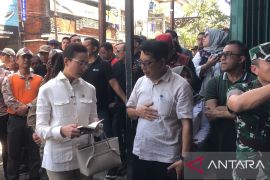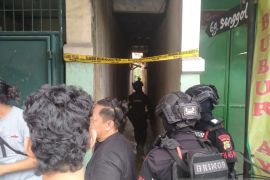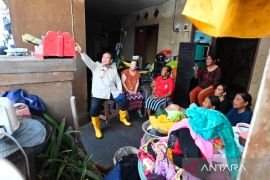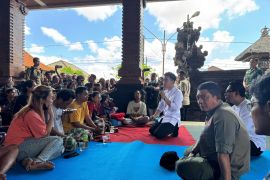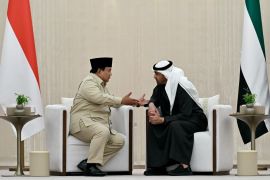Na`eim was giving hand to other doctors and nurses in the emergency room and he was shocked to receive his 2-year-old child arriving dead.
Surrounded by his relatives and friends and sitting on a chair at his son`s wake downstairs the building which was bombarded on Wednesday to receive mourners of colleagues and friends, Na`eim who is still in a trauma, refused to talk about what happened. "I` m terribly sorry, I`m unable to talk about anything."
Al-Qedra, who was in the hospital when the boy was brought by ambulance to the hospital, said that in addition to his dead son, two older sons were injured in the airstrike, one moderately and the other seriously, adding " Na`eim didn`t know that the dead was his child until he saw him."
Over the past eight days of the Israeli aerial operation called Pillar of Defense, 164 Palestinians were killed, 64 of them were children under the age of 14, said al-Qedra, adding "The Israelis should be sued in international courts for violating the international law after they directly targeted civilians."
"During the days of the war, all doctors here and medical teams worked round the clock. They didn`t have enough sleep, and they didn`t go to see their families," said Hani al-Haytham, a physician, working in the emergency room of Shiffa Hospital.
In addition to working so hard and round the clock, the doctors and nurse working in the hospital were also psychologically hurt due to the scenes and images they saw. "They received burned bodies, or people were brought to the hospital as pieces of flesh, " said Dr. al-Haytham.
The child`s uncle, Usama Antar, said that Abdel Rahman Na`eim was killed and two of his older brothers were injured when Israeli war jets struck with two missiles the sixth floor in a tower in Gaza city`s center, adding his sister and her children were living on the roof of an adjacent building.
"The powerful explosions of the two successive Israeli missiles that hit the adjacent building had caused the death of my sister`s son. The power of the bombs pressure destroyed the boy`s organs and caused inner bleeding, where blood came out from mouth and nose," said the uncle Antar.
On Wednesday evening, Israel and the Gaza militant groups led by Hamas reached a ceasefire agreement brokered by Egypt, where both agreed to refrain from carrying out attacks on each other. The child was killed just six hours before the ceasefire came into effect.
"If the ceasefire deal was reached earlier, I believe that the boy and many other victims wouldn`t be killed or hurt," said Antar, as he also sat in the wake that will last for two days more. "The father was not so shocked as the mother was, who carried her child dead after the aerial assault hit the neighboring building."
The boy was buried on Wednesday night, and his mother wasn`t able to see him for the last time. He was taken to the hospital by an ambulance, and he was kept in the morgue for several hours. " The father put his son into the morgue and went back to help his colleagues in the emergency room," said Antar.
While several families were burying their beloved dead children, who were killed in the intensive airstrikes on the Gaza Strip over the past eight days, tens of thousands of Palestinians took to the streets to celebrate a ceasefire, and considered it as a historic victory for the Palestinian people.
"It is really hard to forget the images of the dead infants and children who were either burned to death or buried under the rubble of their destroyed houses. A very difficult image of four dead children under the age of ten from al-Dalou family was the worst," said Khaled Abu Aasi, a teacher from Gaza.
On the first day of ceasefire, the Palestinians, who massively celebrated the ceasefire deal, had begun to make assessments of the consequences of the war, where they first cleaned the streets from the dust, little glass fragments and rubble, after fear and horror which lasted for eight days had disappeared.(*)
Editor: Heru Purwanto
Copyright © ANTARA 2012

